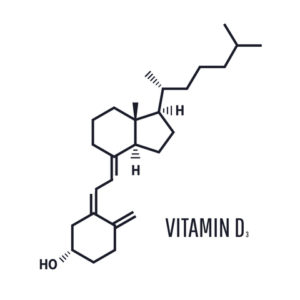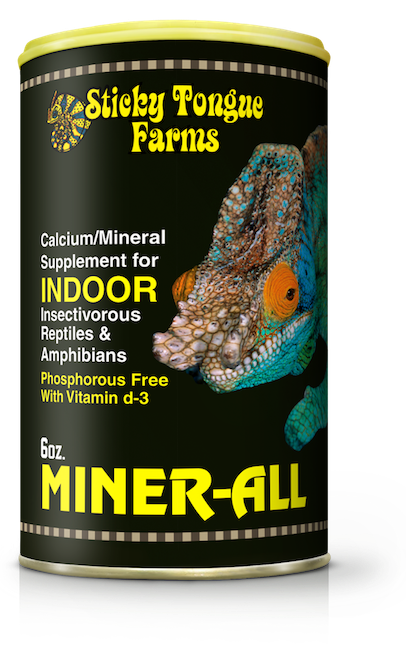Over the last three decades, we’ve used every reptile calcium powder on the market, with really mixed results. Since this is a question we’re asked frequently, we wanted to write a definitive blog article on which supplement performs the best with our reptiles.
Side note: When we say “reptiles” in this article, it also encompasses amphibians.
Let’s start by explaining why using the right calcium powder is so important, and why some powders are better than others.
Calcium is a mineral that’s vitally important for reptiles and amphibians of all ages, but it’s most important for babies and juveniles that are still growing because their bones are increasing in size and density at a faster rate than adults.
Fun fact: Reptiles never stop growing–the rate of growth just slows considerably once they reach adulthood.
Sure, calcium is required for strong bones, we all know that. But, it also helps the heart, nervous system, and muscles perform correctly. It’s of extraordinary importance.
Vitamin D3 Supplementation
Before we get into more detail on calcium, we’d be remiss if we didn’t mention Vitamin D3 and it’s role in a reptile’s body. You’ve probably heard of it, but what exactly does it do? Don’t worry, it’s not complicated.
Vitamin D3 helps your reptile absorb the vitamins and minerals it consumes–it effectively “pushes” these vitamins and minerals throughout the body. Without D3, you can supplement your pet reptile’s diet all you want, but it won’t be able to absorb enough vitamins and minerals to thrive and grow with vigor.
Reptile skin synthesizes vitamin D3 from the Sun naturally. But when reptiles are kept indoors without access to natural sunlight, which is almost always the case, vitamin D3 supplementation becomes necessary.

Too little vitamin D3 can lead to what’s called MBD (Metabolic Bone Disease). This generally results in a reptile that has malformed bones, body shakes, and imbalance. It’s unnecessarily common, and almost always lethal.
You can sometimes remedy MBD it if you take quick action with a quality calcium supplement or with injections of calcium gluconate, but you can’t reverse the bone malformation or stunted growth.
Too much vitamin D3 can basically coat your pet’s muscle and/or cartilage with bone–it’s called ossification. Not good, it’s also lethal. Don’t worry, our top choice revealed in this article has an ideal amount of vitamin D3.
In summary, vitamin D3 allows your reptile to absorb and utilize far more calcium and vitamins than would otherwise be possible without vitamin D3.
Calcium quality is key
So, back to calcium. Quality is paramount. You definitely don’t want calcium derived from oyster shells. Why? Because oysters are the filters of the Ocean–they absorb heavy metals and other toxic substances, including lead, mercury, and arsenic.
This information is based upon scientific articles. Same for cuttlefish bone calcium supplements. Avoid them at all costs.
Rep-Cal and ReptoCal both use ground oyster shell for their calcium powder, according to their website. Why? Because it’s cheap, and they’re either ignorant, or they don’t care. Don’t poison your pet reptiles and amphibians with oyster shell calcium–they deserve better.
You get what you pay for. Don’t buy cheap reptile/amphibian calcium powder.
Calcium mined from the earth is better than anything from the Ocean, but you can take it a step further with regard to purity. Remember, dietary supplements (even for humans) aren’t regulated by the FDA.
In other words, no one’s monitoring the quality of supplement ingredients. This just means you need to do your homework. (Which you’re doing right now by reading this article).
So, how pure is the calcium powder you’re using in your reptiles diet? It’s an important question to answer.
Mixing calcium and vitamins (a big no-no)
One thing you should absolutely avoid is using a reptile supplement powder that includes both calcium and vitamins. The same goes for using them separately, but in the same feeding–don’t do it. It might sound like a good idea, like killing two birds with one stone, but you’re doing your pet a great disservice.
When you combine calcium and vitamins in the same powder, they degrade each other. In fact, calcium can alter how a reptile’s body absorbs magnesium, iron, zinc, and overall mineral metabolism. It’s really that simple.
So, the answer is to use calcium powder at one feeding, and multivitamins at another. Don’t use them in the same feeding or on the same day.
The best calcium powder (winner!)
Talk is cheap. One of the best ways to “test” a calcium powder is to do side-by-side comparisons. The experiment we’ve done over the years is to split a clutch of hatchlings (in our case, often chameleons or leopard geckos) into two groups, and use a different calcium supplement with each group as they hatch and grow.
We could then monitor which groups thrived, grew the fastest, were most active, became the best breeders, etc.
The consistent top performer for us is always Miner-All from Sticky Tongue Farms. We’ll keep an open mind, but the results we’ve seen have been definitive and impressive. Miner-All is the only human grade calcium powder for reptiles. Think about that for a minute.
Miner-All is the only human grade calcium powder for reptiles. Think about that for a minute.
Miner-All is ground to what’s called a “micro-fine powder” so that it sticks to any feeder, including tiny fruit flies.
I can attest that it sticks to crickets, waxworms, superworms, mealworms, roaches, and rodents, but I’ve also discovered it even sticks to feeder fish once they’re put back into the water! Generally with feeder fish the powder will stay on for a half-day to 24 hours.
You might be wondering, “How do I get the calcium powder to stick to the reptile food?” Just put the feeder insects in a small plastic container, add some Miner-All powder, and shake. Just like shake-n-bake. The insects will all be completely covered in a fine calcium powder in a matter of seconds. Now they’re ready to be fed to your reptiles and amphibians.
I mentioned before that we’ve done many side-by-side experiments using different calcium powder products, and Miner-All has consistently outperformed everything else we’ve used–and we’ve used everything on the market.
What does “outperformed” mean? For example, we saw babies supplemented with Miner-All grow the fastest, time after time. This tells us that as a product, it’s an extremely efficient calcium-delivery system.
The moderate levels of vitamin D3 mean that over-supplementing is nearly impossible.
On the flip-side of the coin, we’ve also never had a reptile or amphibian suffer from MBD (Metabolic Bone Disease) while using Miner-All, so it clearly has plenty of vitamin D3 in the powder.
The product has been refined for around 27 years, so it’s no surprise that it’s premium grade.
I hope we’ve been able to convince you that reptile calcium powders are not all the same. Available products vary greatly on the quality spectrum.
How long does reptile calcium powder last?
Most calcium powders won’t expire for 2-3 years. The expiration date stamped on cans of Miner-All is three years from the date of production.
Should I use calcium sand as a substrate?
No, definitely not. Calcium sand, also known as “calci-sand,” is a gimmick, and it’s dangerous for your pet reptile. It’s made of calcium carbonate, which is the same ingredient used for antacid tablets.
Calcium sand would likely be ingested far too often by your reptile, it reduces the stomach’s ability to digest food efficiently (by diluting the acid), and can lead to constipation. It’s also super dusty, which is probably annoying for your pet.
The companies offer different colored calcium sand as well, even purple! I wish I was joking, but I’m not. Ingesting purple dye on a regular basis is probably not the best idea.
Conclusion
The bottom-line is that you need to use a calcium powder that works for your animals, whether they’re snakes, lizards, turtles, tortoises, frogs, toads, newts, or salamanders. Talk is cheap, and advertising is fluff. We trust results that we see with our eyes. You should too.
Quite a few large scale breeders we partner with use Miner-All exclusively, so it’s not exactly a secret we’re divulging, but we did want to pass along our findings to you, our readers.
